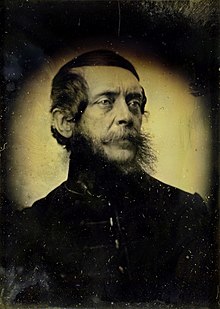
Back لويوش كوشوت Arabic لويوش كوشوت ARZ Layoş Koşut Azerbaijani Лаяш Кошут Byelorussian Лаяш Кошут BE-X-OLD Лайош Кошут Bulgarian Lajos Kossuth BS Lajos Kossuth Catalan Lajos Kossuth Czech Lajos Kossuth Welsh
Lajos Kossuth de Udvard et Kossuthfalva | |
|---|---|
 Daguerreotype portrait by Southworth & Hawes, May 1852 | |
| Governor-President of Hungary | |
| In office 14 April 1849 – 11 August 1849 | |
| Prime Minister | Bertalan Szemere |
| Preceded by | position established |
| Succeeded by | Artúr Görgey (as acting civil and military authority) |
| In office 2 October 1848 – 2 May 1849 | |
| Preceded by | Lajos Batthyány (Prime Minister) |
| Succeeded by | Bertalan Szemere (Prime Minister) |
| Minister of Finance of Hungary | |
| In office 7 April 1848 – 12 September 1848 | |
| Prime Minister | Lajos Batthyány |
| Preceded by | position established |
| Succeeded by | Lajos Batthyány |
| Personal details | |
| Born | Lajos Kossuth de Udvard et Kossuthfalva 19 September 1802 Monok, Kingdom of Hungary, Habsburg monarchy |
| Died | 20 March 1894 (aged 91) Turin, Kingdom of Italy |
| Resting place | Kerepesi Cemetery |
| Political party | Opposition Party (1847–1848) |
| Spouse | Terézia Meszlényi |
| Children |
|
| Relatives | Juraj Košút (uncle) |
| Signature |  |
Lajos Kossuth de Udvard et Kossuthfalva (Hungarian: [ˈlɒjoʃ ˈkoʃut]; Hungarian: udvardi és kossuthfalvi Kossuth Lajos; Slovak: Ľudovít Košút; English: Louis Kossuth; 19 September 1802 – 20 March 1894) was a Hungarian nobleman, lawyer, journalist, politician, statesman and governor-president of the Kingdom of Hungary during the revolution of 1848–1849.[1]
With the help of his talent in oratory in political debates and public speeches, Kossuth emerged from a poor gentry family into regent-president of the Kingdom of Hungary. As the influential contemporary American journalist Horace Greeley said of Kossuth: "Among the orators, patriots, statesmen, exiles, he has, living or dead, no superior."[2][3]
Kossuth's powerful English and American speeches so impressed and touched the famous contemporary American orator Daniel Webster, that he wrote a book about Kossuth's life.[4] He was widely honoured during his lifetime, including in Great Britain and the United States, as a freedom fighter and bellwether of democracy in Europe. Kossuth's bronze bust can be found in the United States Capitol with the inscription: Father of Hungarian Democracy, Hungarian Statesman, Freedom Fighter, 1848–1849. Friedrich Engels considered him to be "a truly revolutionary figure, a man who in the name of his people dares to accept the challenge of a desperate struggle, who for his nation is Danton and Carnot in one person ...".[5]
- ^ Cite error: The named reference
HeadlamEB1911was invoked but never defined (see the help page). - ^ "Hungarian President Louis Kossuth Concerning the Centralization of Power". Captainjamesdavis.net. 27 February 2014. Archived from the original on 30 June 2017. Retrieved 19 November 2017.
- ^ "Kossuth County EDC". Kossuth-edc.com. Archived from the original on 4 March 2016. Retrieved 19 November 2017.
- ^ Webster, Daniel (1851). Sketch of the Life of Louis Kossuth, Governor of Hungary: Together with the Declaration of Hungarian Independence; Kossuth's Address to the People of the United States; All His Great Speeches in England; and the Letter of Daniel Webster to Chevalier Hulsemann. Stringer & Townsend.
- ^ Engels, Frederick (1849). "Magyar Struggle". Neue Rheinsiche Zeitung (194). Retrieved 14 July 2018.